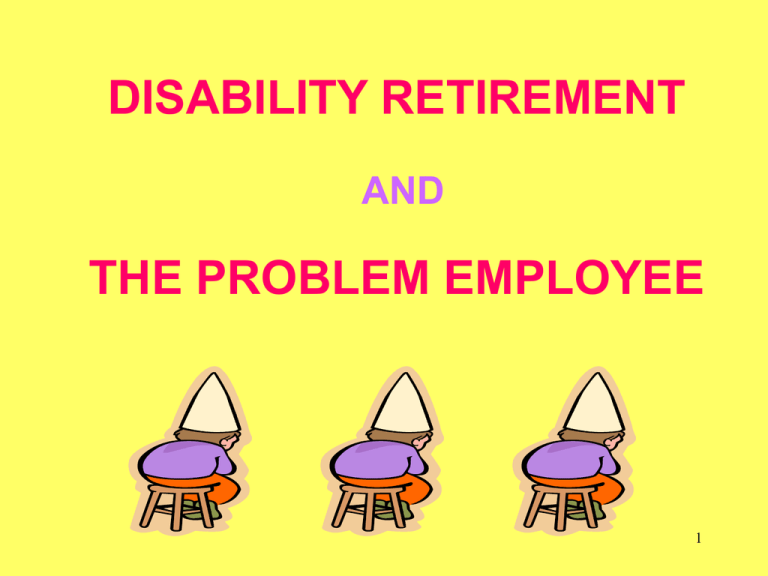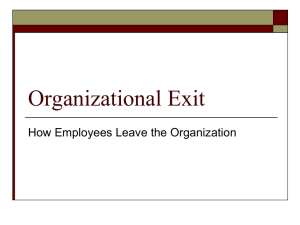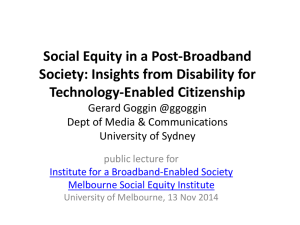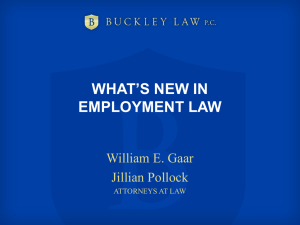DISABILITY RETIREMENT BENEFITS
advertisement

DISABILITY RETIREMENT AND THE PROBLEM EMPLOYEE 1 Diana Ruiz Deputy County Counsel, Sacramento County represents SCERS ruizd@saccounty.net 2 Who Is The Problem Employee? • • • • • The employee who: Cannot get along with anyone Violates policy Has blow-ups with supervisor Commits crimes Has been terminated for cause 3 QUESTIONS Does the problem employee have standing (eligibility) to apply for disability retirement? Can the problem employee establish permanent incapacity? Can the problem employee establish service-connection? Can the problem employee claim incapacity as a result of the discipline process? Answer to all of the above: SOMETIMES. 4 EMPLOYEE TERMINATED FOR CAUSE MAY NOT BE ELIGIBLE FOR DISABILITY RETIREMENT 5 THE TERMINATED EMPLOYEE AND DISABILITY RETIREMENT THE CASE LAW 6 Legal Conclusions The courts have held that: An employee terminated for cause unrelated to disability is ineligible to apply for disability retirement benefits; The timeliness of an application is not determinative of eligibility. 7 Exceptions To The Ineligibility Rule The employee is eligible to apply, if: He was terminated for disability; He was terminated to defeat a valid claim for disability retirement; His entitlement to a disability retirement “matured” prior to the date of his separation from service; or He has not yet been terminated, only suspended. 8 Eligibility Cases Duff v. City of Gardena (1980) 108 Cal.App.3d 930 (PERS) Haywood v. American River Fire Protection Dist. (1998) 67 Cal.App.4th 1292 (PERS) Smith v. City of Napa (2004) 120 Cal.App.4th 194 (PERS) Willens v. Commission on Judicial Qualifications (1973) 10 Cal.3d 451 (Judges’ Retirement Law) 9 Duff v. City of Gardena FACTS Duff was a firefighter who failed to pass probation due to poor job performance. After termination, he filed for and was awarded temporary total disability workers’ comp benefits based on stress. Two years after termination, he filed for DR with PERS. 10 Duff FINDINGS Duff was terminated for cause not related to disability. Once terminated, he was no longer an employee of the City of Gardena. The workers’ comp award of total temporary disability is not sufficient evidence that Duff qualified for disability retirement. (Summerford v. Bd. of Retirement (1977) 72 Cal.App.3d 128.) 11 Duff HOLDING A probationary employee terminated for cause has no vested interest in retirement benefits and, thus, no right to a hearing to determine permanent incapacity or service connection. Duff’s claim is barred by laches because he never filed a workers’ comp claim while on the job and never claimed permanent disability until almost two years after he was released from probation. 12 Duff POLICY Public policy would be violated if Duff prevailed because this would give “an employee, who served a probationary period of slightly over one year, lifetime disability benefits of one-half his salary where there is no indication whatsoever that he even reported a work-related injury.” 13 Haywood FACTS Firefighter was fired for insubordination following progressive discipline. Prior to termination, Haywood filed WC claim for depression caused by discipline. After termination, he filed timely DR application claiming stress of discipline caused depression and permanent incapacity. 14 Haywood FINDINGS Haywood was fired for unwillingness to do his job. His unwillingness was not caused by a medical condition. Haywood was not dismissed for disability. Termination for cause completely severed Haywood’s employment relationship with the District. 15 Haywood HOLDING An employee terminated for cause is ineligible to apply for disability retirement benefits, provided: • Termination was not the result of a disabling medical condition; or • Termination did not preempt an otherwise valid claim for DR benefits. The timeliness of the DR application does not determine eligibility of terminated employee. 16 Haywood ANALYSIS DR laws contemplate the potential reinstatement of the employment relationship if the member recovers from the disability prior to normal retirement age: • The member can petition to return to work; • The employer can reevaluate the member and insist on a return to work if the member has recovered from the disability. 17 Haywood ANALYSIS Termination for cause constitutes a complete severance of the employment relationship and thus precludes a potential reinstatement if the employer were to subsequently determine that the member was no longer disabled. To interpret the statutes otherwise: • Overrides the power of public agencies to discipline employees, and • Would reward poor employees with early retirement. 18 Haywood POLICY DR benefits are intended for employees who become medically unable to perform their duties, not for those who are unwilling to do so. DR laws are not intended as a means by which unwilling employees can retire early in derogation of the obligation of faithful performance of duty. 19 Smith FACTS Firefighter was working light duty due to a work-related back injury. He was fired for failing competency/ performance tests (driving errors). On termination date, he filed a DR application based on back injury. Retirement Board denied, citing ineligibility per Haywood. 20 Smith FINDINGS Smith was dismissed for cause. Smith was not terminated due to disability. (His back injury did not cause him to fail the competency tests.) Smith’s dismissal did not preempt an otherwise valid claim for DR benefits because Smith’s claim had not yet matured. 21 Smith FINDINGS Although Smith was found permanently disabled and QIW in his workers’ comp case, this did not occur prior to his termination and did not establish a matured right to disability retirement predating his termination. Remember: WC ≠ DR 22 Smith HOLDINGS Smith’s termination for cause made him ineligible for DR benefits. Haywood rationale followed. A claim for DR benefits matures only when Retirement Board determines that employee is permanently incapacitated. 23 Smith Notes The court declined to decide which event actually extinguished the right to DR benefits: • • • The effective date of termination, The date of the decision to dismiss the employee, or The date of the underlying conduct giving cause for the dismissal. The court noted: Equity principles may require different result, e.g., if handling of DR application was unduly delayed. 24 Compare: Suspended Official Is Eligible For DR • • • Willens v. Commission on Judicial Qualifications (1973) 10 Cal.3d 451 Judge who was charged with a felony, but not yet convicted, and was suspended from office remained eligible to apply for DR benefits. Pension rights were “vested” and could not be forfeited absent clear statutory intent. Contrary result would deny accused of the presumption of innocence. 25 Hypothetical re Eligibility • With disciplinary action recommending • termination pending, employee agrees to resolve the disciplinary action and his WC case for a lump sum plus his resignation and waiver of any right to reemployment, including any rights under Gov. Code § 31725. Disciplinary action was for dishonesty, but was arguably related to disability. • Is employee eligible for DR benefits? 26 OTHER DISABILITY RETIREMENT ISSUES WITH THE PROBLEM EMPLOYEE 27 Problem Employee With Personality Disorder * • Can’t get along with anyone • Repeatedly challenges supervisor • Is progressively disciplined • Believes he is treated unfairly • Files DR psych claim * Personality order, by definition, preexisted county employment. 28 Personality Disorder & Permanent Incapacity • When is a personality disorder a permanently incapacitating condition? • Medication? • Counseling? • When does a personality disorder simply create a disgruntled employee? In either case, need clear, well-reasoned opinion from medical expert. 29 Personality Disorder & Service-Connection If a personality disorder is incapacitating, did the job: • Aggravate the underlying personality • • disorder, Temporarily increase the symptoms, or Act as a passive stage on which the symptoms of the underlying personality played out? Again, need clear medical opinion! 30 Progressive Discipline • • May employee claim incapacity due to the progressive discipline process? YES (See Traub v. Bd. Of Retirement (1983) 34 Cal.3d 793) Is there a good faith personnel action defense in disability retirement proceedings? No Labor Code § 3208.3 not applicable to DR 31 Problem Employee & Accommodation • • Is inability to get along with one’s supervisor proof of permanent incapacity? No, provided employer can accommodate employee with equivalent job reporting to another supervisor. (See Save Mart Stores v. WCAB (1992) 2 Cal.App.4th 720) 32 Problem Employee & Accommodation • • What if employer makes no secret of the fact they do not want to provide reasonable accommodation to a problem employee? Retirement Board must independently determine whether accommodation is possible. (See O’Toole v. Retirement Bd. of S.F. (1983) 139 Cal.App.3d 600.) 33











